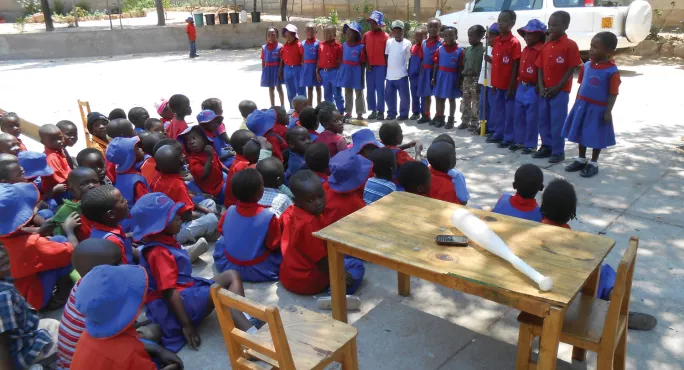- Home
- A day in the life of... Chido Makuwerere
A day in the life of... Chido Makuwerere

In the small hours of dawn, I open my eyes and take some time, silently, in bed, to reflect on the atmosphere at my school - Golden Apple Early Childhood Development Centre in Harare - yesterday. I feel a lump of sadness blocking my throat as I remember those children who are hungry, malnourished or disabled. Sometimes, I feel overwhelmed, and I weep before I get up.
But I am so grateful to be in a position to help my students, who are all orphaned or from vulnerable families, and are aged 3-6 years old. I was trained by Oasis Zimbabwe for over 18 months to become an early childhood development teacher; it is one of the most fulfilling things that I have ever done.
When I get up, I plan for the approaching day with the children. After a cold shower, I grab my teaching kit and head towards the school. I arrive around 7.15am, and set up the classroom for the first activity of the day.
Dressed in colourful clothes and with a smile on my face, I greet the children loudly at 8am with our routine welcome rhymes. The children are chattering and laughing noisily, before they quiet down as we pray to begin the new day.
I observe the children, taking note of those who are withdrawn and may need further support through case management. They could be unwell or facing problems at home. Sometimes when I engage with withdrawn children, they hesitate to open up. I draw on the counselling skills I gained during training to encourage them to share their worries.
Each morning, my mind is filled with notes for referrals. It has become my habit to recall the case files I opened the previous day, with their plans to link children with government social services and other organisations for HIV testing, supplementary feeding, child protection investigations, or physiotherapy. I also look forward to giving psychosocial support to the children and their caregivers. I remember that it is my responsibility to use all my skills and energy, to make my class happy and joyful with new practical lessons.
I reach for the attendance register, call out the children’s names, and realise that someone is absent. I need to follow up with the family as soon as possible. The Zimbabwe national anthem is sung and we say the Lord’s Prayer together. Then we start our learning with activities, which I try to make sure are as fun as possible.
The children bolt out of the classroom at 10am. It is time for a mid-morning snack, which the school provides for them.
At around 10.30am, we resume lessons. Those who do well are rewarded with stars and praise. Those who scored below average are motivated to do even better.
At 11.30am, the children go to play outdoors. I actively participate in the play and observe the children’s behaviour. The children feel motivated when my colleague and I play along with them, strengthening the bonds of trust.
The school day is over at 1pm and we take some time to tell stories, poetry and rhymes to those waiting to be collected - usually under the shade of a msasa tree, as it is very hot inside the classroom. The children love this time and listen well.
It is my responsibility to ensure that each child has their belongings before they leave school. Bags, hats, shoes, books, jerseys, pens and pencils are all reunited with their owners.
Once the children have left, my colleague and I take some time to evaluate the day’s learning, and prepare the schedule for tomorrow, making sure we plan the activities to be as interesting as possible to keep these vulnerable children committed to their education and returning to school each day.
I walk home, sometimes making a home visit on my way to follow up a child we have particular concerns about. I arrive home around 5pm and take a rest before I prepare supper. I will go to bed once it gets dark, which, in Zimbabwe, is around 8pm, so that I am rested for another early start tomorrow.
You can read more about this project at oasiszw.org/education
Keep reading for just £1 per month
You've reached your limit of free articles this month. Subscribe for £1 per month for three months and get:
- Unlimited access to all Tes magazine content
- Exclusive subscriber-only stories
- Award-winning email newsletters